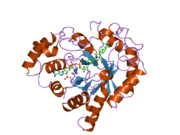Aldo-keto reductase family 1 member B10 is an enzyme that in humans is encoded by the AKR1B10 gene.[5][6][7]
This gene encodes a member of the aldo/keto reductase superfamily, which consists of more than 40 known enzymes and proteins. This member can efficiently reduce aliphatic and aromatic aldehydes, and it is less active on hexoses. It is highly expressed in adrenal gland, small intestine, and colon, and may play an important role in liver carcinogenesis.[7]
References
- ^ a b c GRCh38: Ensembl release 89: ENSG00000198074 – Ensembl, May 2017
- ^ a b c GRCm38: Ensembl release 89: ENSMUSG00000029762 – Ensembl, May 2017
- ^ "Human PubMed Reference:". National Center for Biotechnology Information, U.S. National Library of Medicine.
- ^ "Mouse PubMed Reference:". National Center for Biotechnology Information, U.S. National Library of Medicine.
- ^ Hyndman DJ, Flynn TG (August 1998). "Sequence and expression levels in human tissues of a new member of the aldo-keto reductase family". Biochimica et Biophysica Acta (BBA) - Gene Structure and Expression. 1399 (2–3): 198–202. doi:10.1016/s0167-4781(98)00109-2. PMID 9765596.
- ^ Cao D, Fan ST, Chung SS (May 1998). "Identification and characterization of a novel human aldose reductase-like gene". The Journal of Biological Chemistry. 273 (19): 11429–35. doi:10.1074/jbc.273.19.11429. PMID 9565553.
- ^ a b "Entrez Gene: AKR1B10 aldo-keto reductase family 1, member B10 (aldose reductase)".
External links
- Human AKR1B10 genome location and AKR1B10 gene details page in the UCSC Genome Browser.
- Human ARL1 genome location and ARL1 gene details page in the UCSC Genome Browser.
Further reading
- Scuric Z, Stain SC, Anderson WF, Hwang JJ (April 1998). "New member of aldose reductase family proteins overexpressed in human hepatocellular carcinoma". Hepatology. 27 (4): 943–50. doi:10.1002/hep.510270408. PMID 9537432. S2CID 23740299.
- Strausberg RL, Feingold EA, Grouse LH, Derge JG, Klausner RD, Collins FS, et al. (December 2002). "Generation and initial analysis of more than 15,000 full-length human and mouse cDNA sequences". Proceedings of the National Academy of Sciences of the United States of America. 99 (26): 16899–903. Bibcode:2002PNAS...9916899M. doi:10.1073/pnas.242603899. PMC 139241. PMID 12477932.
- Crosas B, Hyndman DJ, Gallego O, Martras S, Parés X, Flynn TG, Farrés J (August 2003). "Human aldose reductase and human small intestine aldose reductase are efficient retinal reductases: consequences for retinoid metabolism". The Biochemical Journal. 373 (Pt 3): 973–9. doi:10.1042/BJ20021818. PMC 1223539. PMID 12732097.
- Gerhard DS, Wagner L, Feingold EA, Shenmen CM, Grouse LH, Schuler G, et al. (October 2004). "The status, quality, and expansion of the NIH full-length cDNA project: the Mammalian Gene Collection (MGC)". Genome Research. 14 (10B): 2121–7. doi:10.1101/gr.2596504. PMC 528928. PMID 15489334.
- Petrovic MG, Peterlin B, Hawlina M, Petrovic D (2005). "Aldose reductase (AC)n gene polymorphism and susceptibility to diabetic retinopathy in Type 2 diabetes in Caucasians". Journal of Diabetes and Its Complications. 19 (2): 70–3. doi:10.1016/j.jdiacomp.2004.08.004. PMID 15745835.
- Kang ES, Kim HJ, Paek KS, Jang HS, Chang KC, Lee JH, et al. (May 2005). "Phorbol ester up-regulates aldose reductase expression in A549 cells: a potential role for aldose reductase in cell cycle modulation". Cellular and Molecular Life Sciences. 62 (10): 1146–55. doi:10.1007/s00018-005-5024-4. PMID 15928807. S2CID 13502923.
- Lee YS, Paek KS, Kang ES, Jang HS, Kim HJ, Kang YJ, et al. (November 2005). "Involvement of nuclear factor kappaB in up-regulation of aldose reductase gene expression by 12-O-tetradecanoylphorbol-13-acetate in HeLa cells". The International Journal of Biochemistry & Cell Biology. 37 (11): 2297–309. doi:10.1016/j.biocel.2005.04.016. PMID 15936242.
- Vikramadithyan RK, Hu Y, Noh HL, Liang CP, Hallam K, Tall AR, et al. (September 2005). "Human aldose reductase expression accelerates diabetic atherosclerosis in transgenic mice". The Journal of Clinical Investigation. 115 (9): 2434–43. doi:10.1172/JCI24819. PMC 1190371. PMID 16127462.
- Hazemann I, Dauvergne MT, Blakeley MP, Meilleur F, Haertlein M, Van Dorsselaer A, et al. (October 2005). "High-resolution neutron protein crystallography with radically small crystal volumes: application of perdeuteration to human aldose reductase". Acta Crystallographica. Section D, Biological Crystallography. 61 (Pt 10): 1413–7. Bibcode:2005AcCrD..61.1413H. doi:10.1107/S0907444905024285. PMID 16204895.
- Mashkova TD, Oparina NI, Zinov'eva OL, Kropotova ES, Dubovaia VI, Poltaraus AB, et al. (2007). "[Transcription TIMP3, DAPk1 and AKR1B10 genes in squamous cell lung cancer]". Molekuliarnaia Biologiia. 40 (6): 1047–54. doi:10.1134/s0026893306060148. PMID 17209433. S2CID 39287274.
- Tammali R, Ramana KV, Srivastava SK (July 2007). "Aldose reductase regulates TNF-alpha-induced PGE2 production in human colon cancer cells". Cancer Letters. 252 (2): 299–306. doi:10.1016/j.canlet.2007.01.001. PMC 1945127. PMID 17300864.
- Yan R, Zu X, Ma J, Liu Z, Adeyanju M, Cao D (November 2007). "Aldo-keto reductase family 1 B10 gene silencing results in growth inhibition of colorectal cancer cells: Implication for cancer intervention". International Journal of Cancer. 121 (10): 2301–6. doi:10.1002/ijc.22933. PMID 17597105. S2CID 1546354.
External links
- PDBe-KB provides an overview of all the structure information available in the PDB for Human Aldo-keto reductase family 1 member B10 (AKR1B10)]









